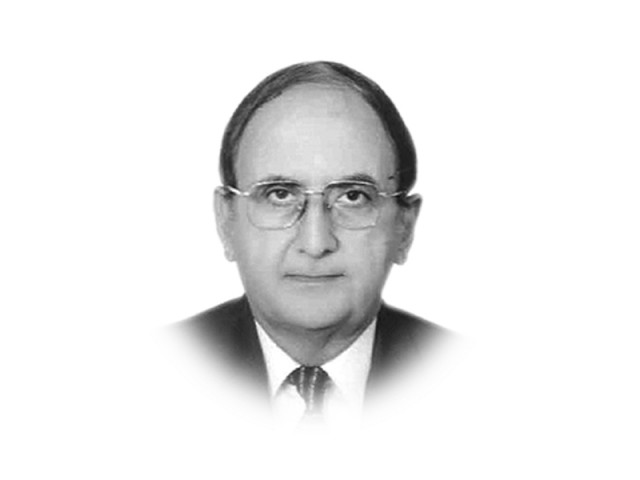Post-election agitation
Civilian, democratic rule in Pakistan can be secured by legal remedies and self-restraint rather than agitation.

The writer is an independent political and defence analyst. He is also the author of several books, monographs and articles on Pakistan and South Asian Affairs
The Pakistan Tehreek-e-Insaf (PTI) was the first party to launch a protest in a constituency it had lost in Lahore. In a day or so, protest marches and dharnas became the new political fashion because every political party questioned the electoral process in the constituencies it lost. By now, a good number of candidates have individually launched their protest in the form of political marches and dharnas by bringing out their loyalists in the streets.
The political parties and individual candidates complained of manipulation of the electoral process in the constituencies where they lost the election. Wherever they won, it was viewed as a fair and free election. The PTI emerged as the single largest party in the Khyber-Pakhtunkhwa Assembly and it also won seats in Punjab at the provincial and federal levels. It views these elections as fair and free. But it raises objections in most places where it has lost. The same can be said about other political parties. The guiding principle is the raising of hue and cry of rigging and manipulation wherever you lose elections and resort to agitation to disrupt civic life.
The PML-N that swept the National Assembly elections by humbling the PPP and the PTI has not demonstrated the confidence of its electoral standing. It has joined with the PML-F and other smaller groups to launch protests against what is described as manipulation of the election in rural Sindh. This is the only area where the PPP has retained its popularity. Now, the PML-N is endeavouring to knock the PPP out of this area by non-electoral means.
As the PTI is questioning the voting procedures in 25 constituencies where it has lost, its political opponents have started making similar demands in the constituencies where the PTI has won elections. Does this mean that either there should be recounting, verification of thumb impression or holding of new elections throughout the country? Every loser is not satisfied with the election-results. As there are multiple candidates in every constituency, several people can challenge the result in each constituency.
What happened in NA-89 (Jhang) is useful for understanding the dynamics of the current protests. The unofficial results declared Sheikh Akram as the winner. One of the losing candidates, Maulana Muhammad Ahmad Ludhianvi (Ahle Sunnat Wal Jamaat, contesting under Muttahida Deeni Mahaz) demanded the recount of rejected votes, postal ballots and prisoners’ votes. As a result of an agreement among the candidates, the checking and recount of demanded categories of votes was done. Sheikh Akram was again declared successful. The Maulana rejected the results and demanded re-election in the constituency under the supervision of the army.
There is no concrete evidence available to suggest that some state intelligence agency or the bureaucracy or a civilian group systematically worked for the victory of some political party and defeat of others. These elections are mostly fair, although some of its procedures need to be improved in the light of the experience of the polling day. The polling stations where complaints surfaced are seven to nine per cent of their total number.
Four types of complaints surfaced in individual constituencies or individual polling stations. First, various administrative and logistic issues were reported from a number of polling stations that delayed the start of voting. There were also management problems during polling in some cases. Second, there were instances of stopping of polling for some time either due to violence or because of some technical problems. This wasted time and caused confusion, giving rise to the fear among some candidates that the electoral process is being manipulated. Third, there were a host of complaints of bogus voting or efforts to do that, partisanship of the polling staff, people caught with ballot papers, etc. Fourth, some complaints pertained to the failure of full compliance with the procedures and requirements of polling.
Legal remedies are available to deal with such issues by filing complaints with the Election Commission and filing of election petition. Subsequently, the high court and the Supreme Court can be approached. The Election Commission of Pakistan (ECP) has accepted some complaints and others are under consideration. Re-counting and rechecking of votes has taken place in some polling stations. Re-polling will take place in some polling stations later this month. There could be more action by the ECP on these lines. The option of election petition is available to aggrieved persons.
The political parties that are expected to form governments at the federal and provincial levels need to demonstrate democratic responsibility. Their political future will be determined by how they perform as the new ruling party and how they serve the people. The success in forcing the ECP to accept their perspective on the elections will not determine their future.
If major parties with a reasonable number of seats at their disposal cannot respect the spirit of democracy, what can one say about the small political parties, including religious political parties that win few seats. These parties or individual candidates do not have much direct stake in the implementation of the results of the elections. The major political parties will be the main losers of the ongoing political adventurism. Civilian and democratic rule in Pakistan can be secured by legal and constitutional remedies and self-restraint rather than agitation.
Published in The Express Tribune, May 20th, 2013.















COMMENTS
Comments are moderated and generally will be posted if they are on-topic and not abusive.
For more information, please see our Comments FAQ